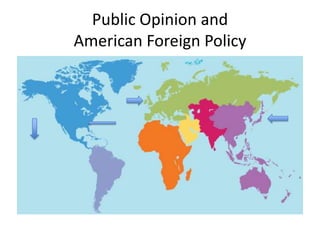
Politics Now Jon Pevehouse Public Opinion And American Foreign Policy
- 1. Public Opinion and American Foreign Policy
- 2. Public Opinion and AFP Survey of 18-24 y.o. Americans 11% of Americans cannot find the U.S. on the map 29% cannot find the Pacific Ocean 58% cannot find Japan 69% cannot find the UK
- 3. A tough one…
- 4. Easier than…
- 5. Ok, maybe we’re just bad at geography… 1994: 46% of Americans believed the 2 largest expenditures in the federal budget were: foreign affairs and welfare 1993: 25% of Americans could ID any ethnic group fighting in Bosnia 1985: 28% of Americans thought the U.S. fought the USSR in World War II
- 6. Does public opinion matter? Traditional view: NO! Almond-Lippmann thesis Public opinion is: Uninformed Volatile Lacking in coherence Even if leaders followed public opinion, they would have no way of knowing what direction to go…
- 11. Traditional View of Public Opinion Most Americans are non-attentive… …but it probably didn’t matter given the “Cold War Consensus” Ex. 1961 Gallup Poll: “Would you fight an all-out nuclear war than live under Communist rule?” Would rather fight in a nuclear war: 81%
- 12. Does public opinion matter? New/Revisionist view: YES! Re-alignment after Vietnam: breakdown of the consensus Public opinion is relatively coherent: the lack of factual knowledge does not mean lack of consistency… When public opinion changes – it is in response to events, not random fluctuations…
- 13. Iraq
- 14. Afghanistan
- 15. The “Pretty Prudent Public” US public’s attitudes seem all over the place on intervention Jentleson: Not hawks or doves, just prudent. Polls from post-Vietnam conflicts: Americans support use of force when goal is foreign policy restraint of another state Americans less support for force aimed at internal regime change of another state
- 16. Still a “Pretty Prudent Public”? Iraq: 54% support invasion 1 week prior (60% if UN SC support is given) Afghanistan: 88% supported invasion (2001) Today: Majority favors continuing war, but that number drops to about 20-25% if object of war is to “secure democracy” Afghanistan: different support dynamics based on this high starting point:
- 17. Afghanistan
- 18. How might public opinion matter? Direct influence on Congress/President Magnitudes need to be strong! Indirect influence Anticipated reaction “boundary setting” But what if it works the other way around? What if elites lead the public, especially if they are relatively disinterested in foreign affairs?
- 19. Indexing Theory Idea that media “indexes” their coverage by what elites are saying (Bennett; Entman) If there are elite debates (i.e., Congress vs. President), then it gets covered. Non-elite debate gets much less coverage… Implications: Can public opinion make a difference? Can Congress make a difference?
- 20. Study of Local Media Our study: 50 largest media markets; all local news broadcasts from two weeks before until two weeks after Congressional debate over force authorization measure Data: 10,000 news broadcasts; 5500 hours of programs Findings: Media follows Congress; Public opinion follows media; President’s pay attention to the public (similar to Zaller)
- 23. Local News
- 24. Support for Iraq War
- 25. Why does it matter? International Relations Theory Theories of audience costs rely on voter judgment Median voter/electoral models often assume knowledge of policy and votes Idea of diversionary behavior assumes fickle public opinion Studies of American Foreign Policy often assume one way causation
- 26. Why does it matter? Public Policy: Afghanistan/Globalization Afghanistan: Will public continue to support the war there?
- 27. Globalization Are there more economic “adjustments” in the future? Will the U.S. need to belt tighten to address imbalances?
- 28. Do Americans Like Trade/Globalization?
- 29. Conclusion We still do not have a good answer as to whether publics lead elites or vice-versa. Depends on issue and salience Future military challenges in Afghanistan will likely have some public support in the long run. Future economic challenges that require costly US adjustments could be more problematic